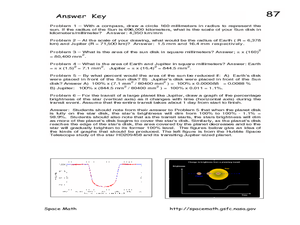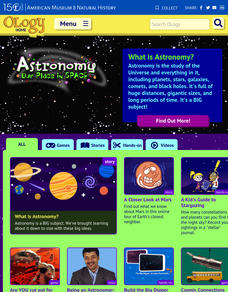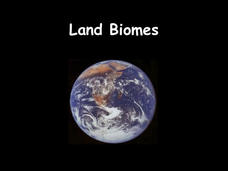Simply Worksheets
Solar System - Identifying Planets
In this space science worksheet, learners read the five descriptions of various planets and match the description with the picture of the planet.
American Museum of Natural History
Cosmic Cookies
Scholars read about each planet then bake a plate of cosmic cookies—no-bake cookies decorated to look like the planets; Mercury, Venus, Earth, Mars, Jupiter, Saturn, Uranus, Neptune, and Pluto.
Messenger Education
Star Power! Discovering the Power of Sunlight
It takes less than 10 minutes for energy from the sun to travel 90 million miles to Earth! In the first installment in a series of four, groups measure the amount of solar radiation that reaches Earth. They then discuss how this is...
American Museum of Natural History
Journey to the Stars
Fifteen detailed pictures and informative captions delve deep into the exploration of stars—their life cycle and importance in the universe.
Curated OER
Kepler-The Hunt for Earth-like Planets
In this hunt for planets worksheet, students read about the Kepler satellite used to detect exoplanets. Students solve 6 problems including drawing a sun disk and determining the scale in kilometers/millimeter, finding the area of the...
Research Parent
Solar System Cards
Find all things solar system in a set of reference cards. Even Pluto makes an appearance! Each of the 24 cards has a picture and accompanying informational text that gives brief background about the object.
Curated OER
What Makes Day and Night?
In this What Makes Day and Night learning exercise, students explain what makes day and night by looking at pictures of the earth and sun and reading 11 related words. Students also write interview questions for a scientist and...
American Museum of Natural History
Planetary Mysteries
A website all about planetary mysteries—it's a one-stop-shop for all things, stars, planets, and space travel. Scholars read an astronomy overview to discover the page's big ideas, then choose from the plethora of resources, including...
Curated OER
Planet Fact Sheet
For this space science worksheet, learners record facts about one of the planets, which they draw in a box on the page. They write the name, distance from the sun, length of day and year, and number of moons. They describe how the planet...
American Museum of Natural History
Make a Terrarium
Scholars read a brief overview of what a terrarium is and how it creates the greenhouse effect, then click on a link to discover the materials and 10 steps they need to build their own.
Curated OER
The Solar System
For this solar system worksheet, students determine the correct unit of measurement to use when measuring a list of items. Students list the five outer planets and four inner planets. This worksheet has 20 fill in the blank questions.
Concord Consortium
The Six Faces of Amzora
Here's a task that is out of this world! Given a description of a fictional cube-shaped planet, scholars answer a set of questions about the planet. They create a two-dimensional map and consider the distances between locations on the map.
Biology Junction
Land Biomes
Biomes share similar climates and ecosystems, despite being separated geographically on the planet. A presentation introduces the six most common land biomes. It focuses on the commonalities in climate, plants, and animals with many...
Curated OER
Planets
In this planets worksheet, students read about Mercury, Venus, and Earth and then complete 21 multiple choice, 2 true or false, and 1 short answer question.
American Museum of Natural History
Solar System Scavenger Hunt
Scholars go on a hunt to locate objects that best fit the measurements to create an eye-catching scale model of the solar system.
Curated OER
Planetary Alignments
In this planetary alignments worksheet, students use 2 different methods to find out when planet alignments will occur. They use a three number series and they use least common multiples to find out when Mercury and Venus will align.
American Museum of Natural History
A Closer Look at Mars
A website looks at how we know so much about Mars—telescopes, robots, and spacecraft—and the search for martian life. Following the informational text are three questions that quiz pupils about possible life on Mars.
Curated OER
The Planet Mars
In this worksheet on the planet Mars, students look at a picture of the planet and read accompanying facts, along with a brief paragraph.
Curated OER
Mars Worksheet
In this planet Mars worksheet, students color a detailed picture of Mars and answer 5 questions about its size, rotation, distance from the sun and other interesting facts. Students will need to do their own research to answer these...
American Museum of Natural History
Meet the Universe's Main Attraction ... Gravity
Learners read a short description about gravity and what it does and then explore the two ideas about how gravity works. After gaining a better understanding of the concept, individuals participate in a thorough experiment on what would...
Messenger Education
Sensing the Invisible: The Herschel Experiment
The electromagnetic spectrum includes everything from very powerful gamma rays (which are used to treat cancer) to much weaker radio waves (which include microwaves). Through a hands-on activity, scholars explore the temperature...
Curated OER
ESL Colors Activity
In this ESL colors worksheet, students watch a video titled "The Colors of the Earth," then choose the correct colors to describe pictures and the correct animals being described.
Curated OER
Earth Day/Nature Vocabulary
In this nature vocabulary worksheet, students identify nature vocabulary words by choosing the correct word for each picture. Students complete 18 problems.
Curated OER
English Exercises: Activities to Teach Peace
In this English exercises: activities to teach peace activity, 5th graders listen the the song Together, interactively select 13 words to complete the lyrics, read a quote, explain it and draw a picture about it, make a peace...























